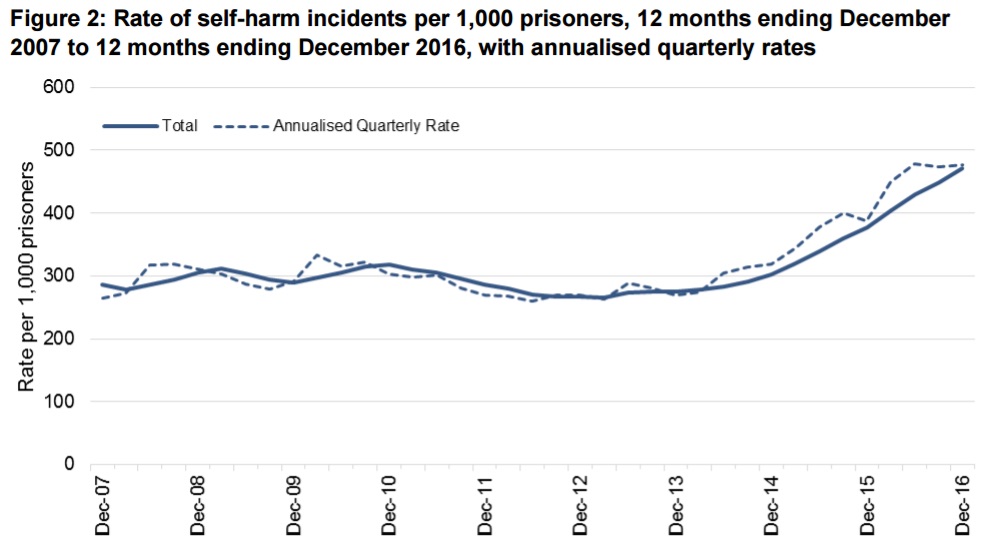Prisoner suicides rate hits all time high – as government drops prisons bill
 A total of 113 prisoners took their life through suicide in the last 12 months, according to the latest Ministry of Justice statistics confirming the scale of the problems concerning violence and mental health in our prisons. The figures, which detail alarming increases in deaths, suicides, assaults and self-harm rates, have prompted campaigners to call for prisons to be treated as central issue in the general election campaign.
A total of 113 prisoners took their life through suicide in the last 12 months, according to the latest Ministry of Justice statistics confirming the scale of the problems concerning violence and mental health in our prisons. The figures, which detail alarming increases in deaths, suicides, assaults and self-harm rates, have prompted campaigners to call for prisons to be treated as central issue in the general election campaign.
The rate of self-inflicted deaths has increased to 1.3 per 1,000, over the double the rate of 2013. There were 2.6 suicides per 1,000 female prisoners, a rate which did not rise above one per 1,000 between June 2008 and March 2014.
Self-inflicted deaths contributed to a total of 344 deaths in prison, a rise of 19% compared to the previous year and the highest number since the current recording process began in 1978. While partly attributable to an aging prison population, this number also includes three homicides, down from six the previous year.
The Ministry of Justice did not comment on the figures, citing the election period ‘purdah’. The Prisons and Courts Bill, which contains the government’s proposals for prison reform, is to progress no further this Parliament – see here.
Incidents of self-harm increased by 24%, or 7,848 cases from the previous year, to reach a record high of 40,161 incidents – or around 110 each day. This included 2,740 which required hospital treatment, an increase of 21% from the previous year and a record high in the recording period. The rate of self-harming prisoners reached an alarming 129 per 1,000.
Assaults have continued to increase, reaching a record high of 26,022 incidents in the year up to December 2016, an increase of 5,504 from the previous 12 months. Of these, 3,519 were serious assaults, up 25 percent from the previous year. There were 6,844 prisoner-on-staff assaults, again an increase – this time of 38%.
The already alarming figures come in the wake of April’s Council of Europe report which reported ‘systemic and structural weaknesses in the documentation process’ of violent incidents behind bars in England in Wales. At HMP Doncaster, for example, the delegation witnessed incidents either not recorded or recorded in a fashion which undermined their severity. The report concluded that official figures ‘under-record the actual number of incidents and consequently fail to afford a true picture of the severity of the situation’.
The statistics have prompted calls for political parties to focus on deteriorating prison conditions as a matter of urgency throughout the current general election campaign. Deborah Coles, director of the charity INQUEST which investigates and supports those affected by deaths in custody, argued that these ‘shocking figures reflect the desperate reality of prison life characterised by suicide, self-harm and violence and the failure to protect those in its care. Prisons are places where the safety and dignity of prisoners is increasingly under threat’.
Coles added: ‘Politicians need to address this failing system and the associated economic and human costs. Until there is a dramatic reduction in the use of prison and a redirection of resources into radical community alternatives, then the death and harm will continue.’






